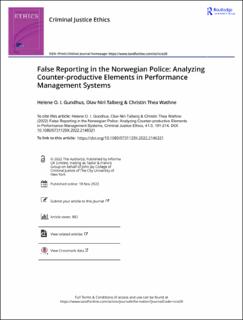| dc.contributor.author | Gundhus, Helene Ingebrigtsen | |
| dc.contributor.author | Talberg, Olav Niri | |
| dc.contributor.author | Wathne, Christin Thea | |
| dc.date.accessioned | 2023-01-09T17:00:05Z | |
| dc.date.available | 2023-01-09T17:00:05Z | |
| dc.date.created | 2022-11-22T13:56:09Z | |
| dc.date.issued | 2022-11-18 | |
| dc.identifier.issn | 0731-129X | |
| dc.identifier.issn | 1937-5948 | |
| dc.identifier.uri | https://hdl.handle.net/11250/3042095 | |
| dc.description.abstract | Despite the growing body of work exploring the weaknesses of police performance systems and the displacement of their goals, less attention has been given to why police officers resist and circumvent by false reporting. Whether police report honestly on their activities is a matter of considerable significance given the role that police have in a broadly democratic society, and the overall question is whether the false reporting undermines the integrity of the police or if it is a collective coping strategy that safeguards the police ethos? This survey reveals that 25% of respondents (n = 2248) had manipulated the numbers at least once in the previous year. To identify why they did so, the variables selected for analysis are those determining their view of the Management by Objective (MBO) system, how far they have participated in the MBO process and how often they are unable to assist a member of the public. Our results show that men are more likely to manipulate the numbers than women and non-leaders are more likely to do so than leaders. Respondents were more likely to submit false reports if they had not participated in the MBO process, were not motivated by MBO goals, believed the MBO indicators misdirected their focus and frequently felt that they were forced to reject members of the public they would like to help. Our findings further show that public servants can be corrupted, though they do not “bring” vices to work with them, but rather acquire vices through what is required of them. | en_US |
| dc.language.iso | eng | en_US |
| dc.publisher | Routledge | en_US |
| dc.relation.ispartofseries | Criminal Justice Ethics;Volume 41, 2022 - Issue 3 | |
| dc.rights | Attribution-NonCommercial-NoDerivatives 4.0 Internasjonal | * |
| dc.rights.uri | http://creativecommons.org/licenses/by-nc-nd/4.0/deed.no | * |
| dc.subject | False crime reporting | en_US |
| dc.subject | Management by objective | en_US |
| dc.subject | New public management | en_US |
| dc.subject | Norwegian police | en_US |
| dc.subject | Professionalism | en_US |
| dc.title | False Reporting in the Norwegian Police: Analyzing Counter-productive Elements in Performance Management Systems | en_US |
| dc.type | Peer reviewed | en_US |
| dc.type | Journal article | en_US |
| dc.description.version | publishedVersion | en_US |
| dc.rights.holder | © 2022 The Author(s) | en_US |
| cristin.ispublished | true | |
| cristin.fulltext | original | |
| cristin.qualitycode | 1 | |
| dc.identifier.doi | https://doi.org/10.1080/0731129X.2022.2146321 | |
| dc.identifier.cristin | 2078291 | |
| dc.source.journal | Criminal Justice Ethics | en_US |
| dc.source.volume | 41 | en_US |
| dc.source.issue | 3 | en_US |
| dc.source.pagenumber | 191-214 | en_US |

